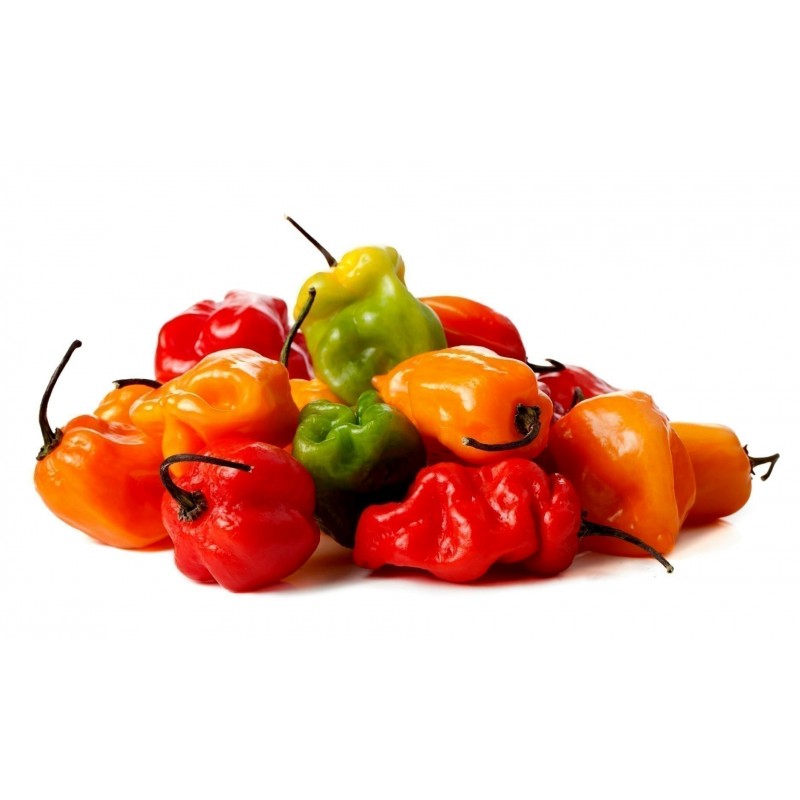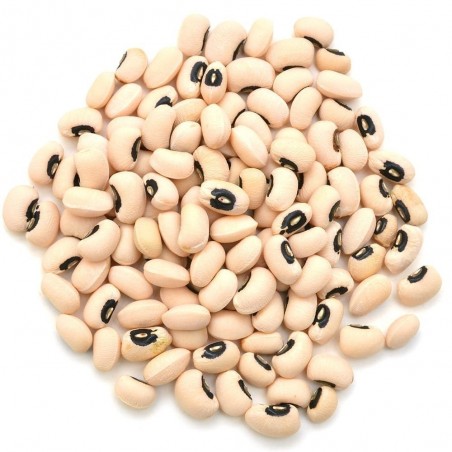
Habanero Red, Yellow, Orange Seeds
Habanero Red, Yellow, Orange Seeds
Price for Package of 10, 20 seeds.
The habanero is a variety of chili pepper. Unripe habaneros are green, and they color as they mature. The most common color variants are orange and red, but the fruit may also be white
Habanero Red, Yellow, Orange Seeds
Price for Package of 10, 20 seeds.
The habanero is a variety of chili pepper. Unripe habaneros are green, and they color as they mature. The most common color variants are orange and red, but the fruit may also be white, brown, yellow, green, or purple. Typically, a ripe habanero chili is 2–6 cm (0.8–2.4 in) long. Habanero chilis are very hot, rated 100,000–650,000 on the Scoville scale. The habanero's heat, its flavor, and its floral aroma have made it a popular ingredient in hot sauces and spicy foods.
The name indicates something or someone from La Habana (Havana). In English, it is sometimes spelled and pronounced habañero, the tilde being added as a hyperforeignism patterned after jalapeño.
Origin and current use
The habanero chili comes from the Amazon, from which it was spread, reaching Mexico. A specimen of a domesticated habanero plant, dated at 8,500 years old, was found at an archaeological site in Peru.[citation needed] An intact fruit of a small domesticated habanero, found in pre-ceramic levels in Guitarrero Cave in the Peruvian highlands, was dated to 6500 BC.
The habanero chili was disseminated by Spanish colonists to other areas of the world, to the point that 18th-century taxonomists mistook China for its place of origin and called it Capsicum chinense ("the Chinese pepper").
Today, the largest producer is the Yucatán Peninsula, in Mexico. Habaneros are an integral part of Yucatecan food, accompanying most dishes, either in natural form or purée or salsa. Other modern producers include Belize, Panama, Costa Rica, Colombia, Ecuador, and parts of the United States, including Texas, Idaho, and California.
The Scotch bonnet is often compared to the habanero, since they are two varieties of the same species, but they have different pod types. Both the Scotch bonnet and the habanero have thin, waxy flesh. They have a similar heat level and flavor. Both varieties average around the same level of pungency, but the actual degree varies greatly from one fruit to another according to genetics, growing methods, climate, and plant stress.
In 1999, the habanero was listed by Guinness World Records as the world's hottest chili, but it has since been displaced by other peppers. The Bhut jolokia (or ghost pepper) and Trinidad moruga scorpion have since been identified as native Capsicum chinense subspecies even hotter than the habanero. Breeders constantly crossbreed subspecies to attempt to create cultivars that will break the record on the Scoville scale. One example is the Carolina Reaper, a cross between a Bhut jolokia pepper with a particularly pungent red habanero.
Cultivation
Habaneros thrive in hot weather. Like all peppers, the habanero does well in an area with good morning sun and in soil with a pH level around 5 to 6 (slightly acidic). Habaneros which are watered daily produce more vegetative growth but the same number of fruit, with lower concentrations of capsaicin, as compared to plants which are watered only when dry (every seven days). Overly moist soil and roots will produce bitter-tasting peppers. Daily watering during flowering and early setting of fruit helps prevent flower and immature fruit from dropping, but flower dropping rates are reported to often reach 90% even in ideal conditions.
The habanero is a perennial flowering plant, meaning that with proper care and growing conditions, it can produce flowers (and thus fruit) for many years. Habanero bushes are good candidates for a container garden. In temperate climates, though, it is treated as an annual, dying each winter and being replaced the next spring. In tropical and subtropical regions, the habanero, like other chiles, will produce year round. As long as conditions are favorable, the plant will set fruit continuously.
Cultivars
Several growers have attempted to selectively breed habanero plants to produce hotter, heavier, and larger peppers. Most habaneros rate between 200,000 and 300,000 on the Scoville scale. In 2004, researchers in Texas created a mild version of the habanero, but retained the traditional aroma and flavor. The milder version was obtained by crossing the Yucatán habanero pepper with a heatless habanero from Bolivia over several generations.
Black habanero is an alternative name often used to describe the dark brown variety of habanero chilis (although they are slightly different, being slightly smaller and slightly more sphere-shaped). Some seeds have been found which are thought to be over 7,000 years old. The black habanero has an exotic and unusual taste, and is hotter than a regular habanero with a rating between 400,000 and 450,000 Scoville units. Small slivers used in cooking can have a dramatic effect on the overall dish. Black habaneros take considerably longer to grow than other habanero chili varieties. In a dried form, they can be preserved for long periods of time, and can be reconstituted in water then added to sauce mixes. Previously known as habanero negro, or by their Nahuatl name, their name was translated into English by spice traders in the 19th century as "black habanero". The word "chocolate" was derived from the Nahuatl word, xocolātl [ʃoˈkolaːt͡ɬ], and was used in the description, as well (as "chocolate habanero"), but it proved to be unpronounceable to the British traders, so it was simply named "black habanero".
A 'Caribbean Red,' a cultivar within the habanero family, has a citrusy and slightly smoky flavor, with a Scoville rating ranging from 300,000 to 445,000 Scoville units.
| HEIRLOOM ? | Yes |
|---|---|
| بذور العضوية؟ | Organic Seeds |
| العضوية / الطبيعية؟ | Organic/Natural: Yes |
| صالح للأكل؟ | Edible |
| أنواع الفلفل الحار؟ | Capsicum chinense |
| نبات معمر؟ | Perennial plant : Yes |
| بذور منتقاة بعناية؟ | Handpicked seeds |
| الشركة المصنعة ؟ | Manufacturer: Seeds Gallery |
| النبات مناسب للنمو؟ | The plant is suitable for growing in a greenhouse The plant is suitable for growing on a balcony-terrace The plant is suitable for outdoors cultivation |
| مناسبة للنمو في وعاء الزهور؟ | Suitable for pot: Yes |
| ارتفاع النبات ؟ | Plant height 1.5 m |
| وزن الفاكهة؟ | وزن الثمرة: حتى 15 جرام |
| نبات طبي ؟ | Medicinal Plant: Yes |
| SHU ? | 350.000 - 600.000 SHU |


Your review appreciation cannot be sent
Report comment
Report sent
Your report cannot be sent
اكتب تعليقك
Review sent
Your review cannot be sent
🌍 الشحن العالمي من الاتحاد الأوروبي
نقوم بالشحن إلى جميع أنحاء العالم من الاتحاد الأوروبي باستخدام بريد مسجل مع تأكيد استلام.
📦 تتبع الشحنة
لتتبع شحنتك، قم بتسجيل الدخول إلى حسابك، ثم اذهب إلى سجل الطلبات > التفاصيل وستجد رقم التتبع هناك.
التتبع العالمي: 17Track
لتتبع أرقام مثل RGxxxxxxHR: تتبع Posta.hr
🕒 يرجى الانتظار 24 ساعة على الأقل بعد الشحن لظهور معلومات التتبع.
⚠️ ملاحظات هامة
الدفع عند الاستلام غير متاح.
تحقق من مجلد البريد العشوائي/الغير هام في بريدك الإلكتروني للحصول على إشعارات الطلبات.
استخدم فقط نموذج الاتصال الموجود على موقعنا.
لن يتم الرد على الرسائل المرسلة مباشرة إلى بريدنا الإلكتروني.
📱 رقم الهاتف مطلوب
يرجى إدخال رقم هاتفك المحمول مع رمز البلد.
مثال: +966 512 345 678
🚚 شروط التوصيل
تتطلب الشحنات المسجلة توقيع المستلم.
لا تطلب إذا:
كنت تريد التسليم إلى صندوق بريد
لن تكون متواجداً لاستلام الطرد
تريد تسليمه إلى جار (❌ هذا غير ممكن)
📬 إذا أدخلت عنوان صندوق بريد وفُقدت الشحنة، فلن تكون مؤهلاً لاسترداد الأموال.
↩️ المرتجعات وإعادة الشحن
إذا تم إرجاع الشحنة إلينا لأي سبب:
سيتم فرض رسوم إرجاع 2 يورو
بالإضافة إلى تكلفة إعادة الشحن
⏱ التأخير والتتبع
إذا أظهر التتبع أن الشحنة لا تزال عند المرسل، فهذا يعني أنها في الطريق.
يرجى التواصل مع مكتب البريد المحلي باستخدام رقم التتبع.
نحن لسنا شركة بريدية ولا يمكننا تتبع الشحنات بالنيابة عنك.
لسنا مسؤولين عن مدة التوصيل.
🔍 يمكننا بدء تحقيق بفقدان الشحنة بعد مرور 30 يوماً على تاريخ الشحن فقط.
✈️ خيارات الشحن
| نوع الشحن | وقت المعالجة | تأمين | احتمال التأخير | ملاحظات |
|---|---|---|---|---|
| الشحن العادي | 7–10 أيام عمل | ❌ | 7–14 يومًا | الخيار الاقتصادي |
| شحن ذو أولوية | 1–7 أيام عمل | ❌ | 3–10 أيام | أولوية في المعالجة – لكن ليس بالضرورة أسرع شحن |
| شحن مؤمَّن | 1–7 أيام عمل | ✅ | 3–10 أيام | استرداد في حال فقدان الشحنة، متاح للطلبات حتى 150 يورو |
🕒 المدة التقديرية للتوصيل:
داخل الاتحاد الأوروبي: 3–20 يوم عمل
عالميًا: 5–30 يوم عمل
أمثلة للتوصيل إلى الولايات المتحدة: 27، 22، 19، 17، 13 يومًا
💳 طرق الدفع
💶 التحويل البنكي (SEPA / IBAN / SWIFT-BIC)
تأكد من كتابة رقم الطلب في تفاصيل التحويل (مثال: SGS-19811702).
في حال غياب المرجع، قد يتأخر تأكيد الدفع أو يتم إلغاء الطلب.
إذا لم يتم استلام الدفعة خلال 7 أيام، سيتم إلغاء الطلب تلقائيًا.
🅿️ PayPal
نقبل المدفوعات بـ اليورو فقط عبر PayPal.
يرجى تحويل العملة إلى اليورو أثناء عملية الدفع.
💳 الدفع بالبطاقة
الدفع يتم عبر موقعنا: Exotic Seeds Store
نقبل: Visa، MasterCard، American Express، Diners Club، UnionPay، JCB، Discover وغيرها.
💡 العميل يتحمل رسوم المعاملات البنكية إن وجدت.
يرجى تزويدنا بإثبات الدفع لتسريع معالجة طلبك.
📅 ملاحظات إضافية
لا نعالج الطلبات أو نقوم بالشحن أيام السبت والأحد.
يرجى دائمًا قراءة التنبيهات الهامة على موقعنا (مثل العطل الرسمية أو الشروط الخاصة).
📫 ملاحظة:
لا ترسل لنا رسائل على البريد الإلكتروني مباشرة. استخدم فقط نموذج الاتصال الموجود على موقعنا.
Related Products





























